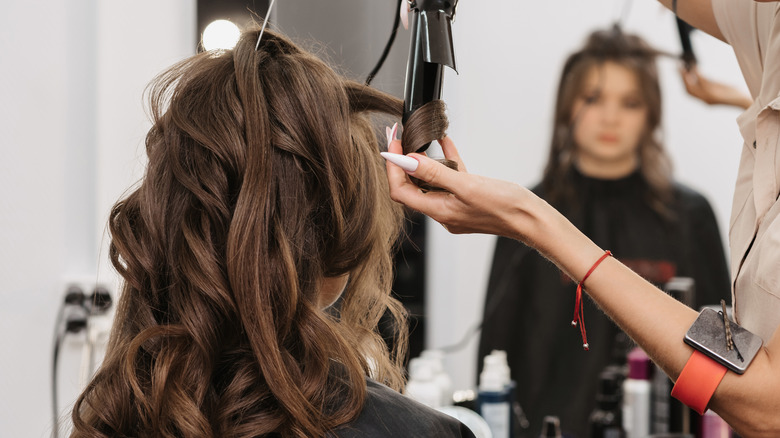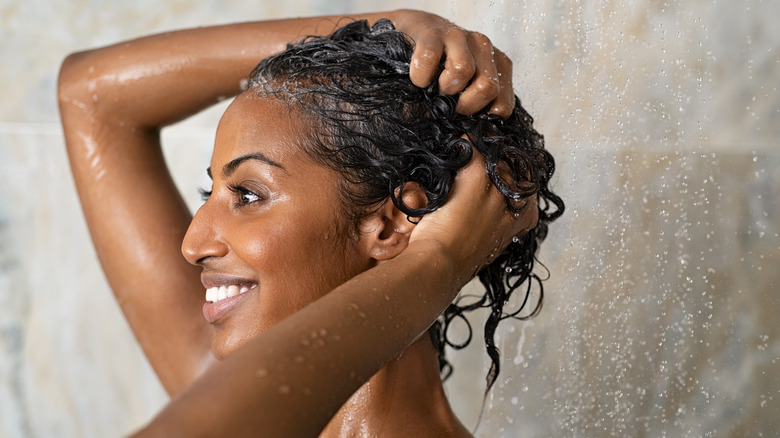How Often Should You Really Be Conditioning Your Hair?
Striking the right balance between greasy hair from over-conditioning and dry, damaged strands from under-conditioning can be challenging. Having soft, healthy hair is a goal that many people strive for, but just how often should you be conditioning to achieve silky smooth locks? There are several factors that determine the optimal time between conditioning sessions, including your hair type, whether you color or dye your hair, and how often you expose your strands to heat from blow-drying and the sun (per Well+Good). There is a conditioning routine out there that is just right for your locks.
Conditioner is a substance used to moisturize hair and is often used alongside shampoo, which contains cleansing agents (via Healthline). Conditioning products typically contain cationic surfactants, emollients, and oils. Some products use silicones to coat hair, which is why such products are often promoted to reduce frizz, add shine, and fight humidity. You can use a conditioner in the shower that washes out, or purchase a leave-in conditioner product.
Across the spectrum of conditioning products out there, most serve the same purpose, notes Healthline. A good conditioner should moisturize your hair and help your locks recover after heat exposure, especially following heat damage from blow dryers and other styling appliances. Since shampoos can strip moisture from hair, conditioners are usually recommended for use after washing hair. Finding the right conditioning product for your hair and knowing how often to use it will give you fairytale-worthy locks.
Your hair type matters
When it comes to determining how often you should use conditioner, one of the biggest factors is your hair type. First, you'll want to know which products work best for your tresses. For hair that is dry or coarse, adding a leave-in conditioner to your routine will give you more moisture protection (via Healthline). Both leave-in products and deep conditioning treatments, including salon treatments, are good for coarse, dry, and even curly hair. If your hair is naturally oily, you'll want to stay away from leave-in conditioners and instead opt for conditioners that you can wash out in the shower, or even a cleansing conditioner. For fine hair, using a rinse-out conditioner is also recommended.
How you apply conditioner can be just as important as how often you apply it. Dry, coarse, and curly hair should be lathered throughout with conditioner, while fine and naturally oily hair should only have the ends conditioned, notes Healthline.
According to Byrdie, many people aren't using the correct type of conditioner for their hair type, which is mostly due to how many product options are on the shelves. People with dry, brittle, or damaged hair can benefit from products containing coconut oil but should stay away from items that are volumizing. A trick for fine or oily hair is to condition it before using shampoo. People with naturally curly hair should avoid products that are too heavy so curls won't be weighed down and instead go for oil-based creams and leave-in conditioners.
Timing is important
Finding the right balance when it comes to using conditioner can prevent your hair from being over-conditioned or under-conditioned. According to Healthline, signs that you've over-conditioning include hair that becomes greasy or difficult to style when using heat-based appliances. Similarly, a loss of buoyancy or lack of volume can indicate over-conditioning, as can an excessive amount of shine to your locks. While we all probably want to have hair with a glossy sheen, over-conditioning can give your hair a tad too much shine. When it comes to under-conditioning, your hair is at risk of becoming extremely dry, brittle, and even breaking. You may experience excessive frizz and tangling of your hair, in addition to a dull appearance of your strands.
WebMD reports that your hair type and chosen products will play a role in how often you should apply conditioner. Deep conditioning products can be used once a week to a couple times a month. Rinse-out conditioners can be used daily, but according to Healthline, you may want to use them less often if you have fine or oily hair. If you opt for leave-in conditioner, you can generally use it after a rinse-out conditioner. Healthline suggests using it once a week.
Discovering the sweet spot for your unique hair when it comes to how often you should use conditioner may take some trial and error, but knowing the signs of over-conditioning and under-conditioning can help get you there faster.



